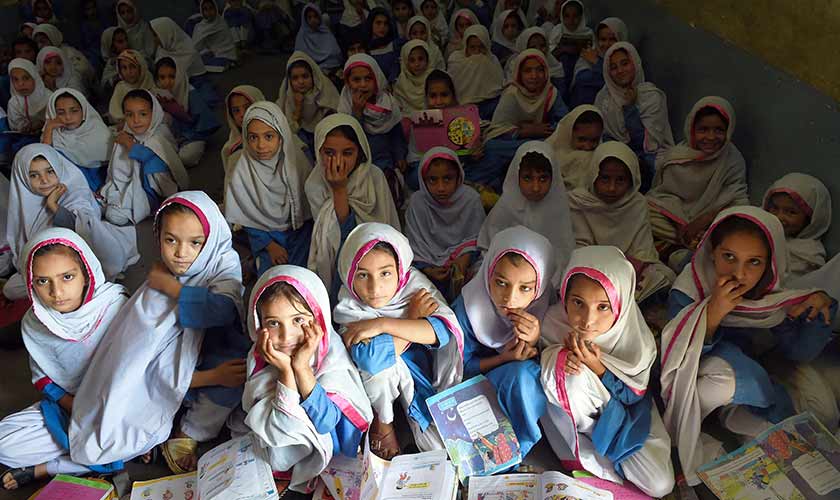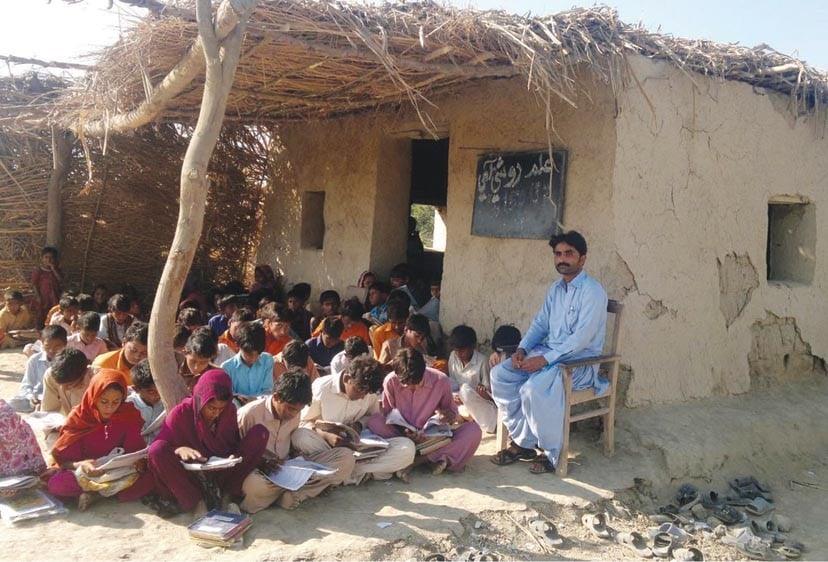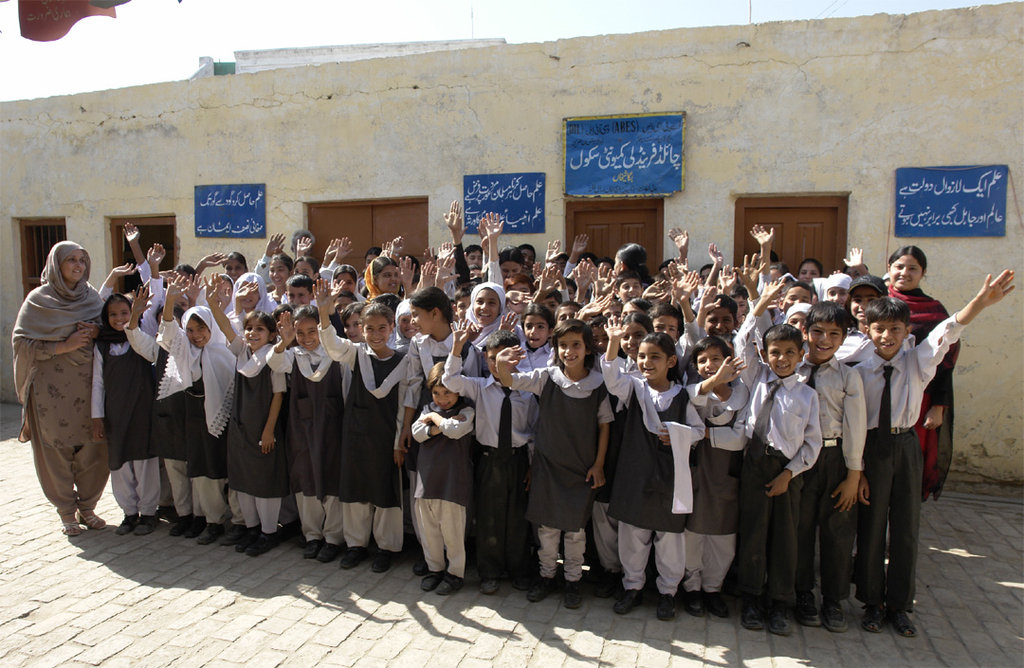- Payment Options
- Terms Conditions
- Malibu 453 blv
- info@charity.com


Poverty and education are inseparable in Pakistan. The two feed into each other in a cycle that keeps millions of families trapped for generations. Poverty squeezes household budgets, forcing parents to make impossible choices between survival and schooling. When income is barely enough to cover food, rent, or medical care, education often becomes the first expense to go. Children are sent to work, care for siblings, or help earn daily wages—while their dreams of learning fade away.
According to the World Bank, nearly 42.3% of Pakistan’s population lives below the poverty line, and an alarming 80% of 10-year-olds cannot read and understand a simple story—a measure known as “learning poverty.” These statistics reveal how deeply poverty affects education. Families in poverty struggle to afford books, uniforms, transport, or even nutritious meals—essentials that directly influence concentration and learning outcomes. Without these, children fall behind quickly, lose motivation, and often drop out entirely.

The education system itself reflects poverty’s shadow. Schools in low-income districts—like many in rural Khyber Pakhtunkhwa and Mardan—often lack qualified teachers, electricity, and digital access. Classrooms are overcrowded, and girls face additional cultural and safety barriers. When students attend such under-resourced schools, they may complete years of schooling without gaining basic literacy or numeracy skills.
As the World Bank notes, this learning crisis is a critical threat to Pakistan’s future workforce and long-term economic stability.
But the reverse is also true: education reduces poverty. Each additional year of schooling can increase an individual’s earnings by up to 10%, according to global research. Educated communities experience lower unemployment, improved health outcomes, and stronger civic participation. This is how education affects poverty—it equips people with the skills and knowledge to access better jobs, innovate, and break free from generational hardship.
In Mardan and across Pakistan, investing in education is the most effective poverty-reduction strategy. When a child gains literacy, it ripples through the community—raising incomes, empowering women, and fostering long-term stability. Scholarships and learning programs play a crucial role in this transformation, ensuring that poverty no longer determines a child’s future.
Education is not just about classrooms or textbooks—it is the single most powerful force that can break the chains of poverty. But for education to truly transform lives, it must be accessible, equitable, and of quality. In Pakistan, where millions of children still struggle to access learning opportunities, the power of education to lift communities out of hardship has never been more urgent—or more real.
When children from low-income families are given the chance to learn—not just to attend school, but to gain skills that shape their futures—the impact extends far beyond their own success. Education sparks productivity, fuels entrepreneurship, and builds stronger, more inclusive societies. It gives families the stability to move from mere survival to genuine progress. It turns uncertainty into opportunity.
At the heart of every successful education system lies one essential truth: every child must learn to read, write, and understand basic math by the end of primary school. These early skills are the foundation of all future learning. Without them, years spent in school often amount to little more than attendance records—children sit in classrooms but remain locked out of true learning.
This is where Pakistan stands at a crossroads. Millions of children, especially in rural and underserved regions, face a learning crisis that mirrors the nation’s income inequality. Yet this challenge is also an extraordinary opportunity. By investing in foundational learning, teacher training, and community-based schools, Pakistan can close the learning gap that keeps so many trapped in poverty.
According to UNICEF’s 2023 report on equitable education financing, even a 1% increase in education funding directed toward the poorest students could lift 35 million children worldwide out of learning poverty. For Pakistan, that shift could mean millions of children—especially in districts like Mardan—finally gaining the skills and confidence to build a better future.
When a child learns, a family rises. When a family rises, a community thrives. And when communities thrive, nations prosper. Education has a ripple effect that reaches far beyond the classroom. Literate parents are more likely to value and support their children’s schooling. Educated mothers raise healthier children. Communities with higher literacy rates enjoy lower poverty, stronger civic participation, and greater equality.
In Mardan and across Pakistan, these stories are being written every day. Every scholarship, every school book, every hour spent learning is a small act of resistance against poverty—and a step toward dignity, independence, and hope.
Khyber Pakhtunkhwa (KP) faces steep access and quality gaps; partners highlight persistent out-of-school and dropout risks driven by distance, poverty, and school quality constraints.
According to UNICEF, Pakistan has 22.8 million out-of-school children, the second-highest number in the world. A significant share of these children live in Khyber Pakhtunkhwa, where economic hardship, population displacement, and underfunded public schools intersect to create deep educational divides.
Within KP, the district of Mardan is a striking example. News and government tallies suggest that over 231,000 children in Mardan are out of school, and girls make up the majority of them. Behind each number lies a story—of a girl walking miles to reach a school that might not exist, of a boy leaving school to support his family, or of a family forced to choose between survival today and opportunity tomorrow.

These numbers fluctuate with each survey, but the trend remains clear: educational deprivation in Mardan is both concentrated and gendered. Poverty, early marriage, and social expectations disproportionately affect girls, who are less likely to re-enroll once they drop out.
UNICEF notes that girls from the poorest families are three times less likely to attend school than boys from wealthier backgrounds.
The situation is compounded by resource disparities. Many rural schools lack boundary walls, sanitation facilities, or female teachers—all key factors influencing girls’ enrollment and retention.
Teachers often serve in overcrowded classrooms with few learning materials, and families struggling under inflation can rarely afford uniforms, books, or transport. These challenges together reinforce the cycle of poverty and education inequality that defines much of KP’s rural landscape.
From the World Bank to UNICEF, the IMF, and UNDP, the message is unanimous: education is the world’s most powerful weapon against poverty. Decades of research and global experience point to the same truth—when a child learns, everything changes. For a country like Pakistan, and for communities like Mardan, this truth is more than a policy statement—it’s a lifeline.
The World Bank’s 2025 Country Overview paints a sobering picture: over 42% of Pakistan’s population lives below the poverty line, and nearly 80% of 10-year-olds cannot read and understand a simple passage—a crisis known as learning poverty. These numbers aren’t abstract—they represent real children whose futures are slipping away before they’ve even begun.
The World Bank’s call is clear: reducing learning poverty is the foundation of shared prosperity. A child who learns to read by age 10 is far more likely to stay in school, secure better employment, and break the cycle of poverty.
In its landmark 2023 report, Transforming Education with Equitable Financing, UNICEF exposed a critical truth—education funding around the world often fails the children who need it most. The poorest 20% receive the smallest share of education resources, while wealthier groups benefit the most.
But the report also offers hope. Even a small change—a 1% increase in education spending directed toward the poorest children—could lift 35 million primary-school-aged children worldwide out of learning poverty.
The International Monetary Fund (IMF), in its ongoing collaboration with Pakistan, emphasizes something every parent in Mardan already knows: when times are tough, education must never be sacrificed. The IMF has urged Pakistan to protect and expand social spending—especially in education and health—even while stabilizing its economy.
The United Nations Development Programme (UNDP) ranks Pakistan’s Human Development Index (HDI) at 0.540 (2022), one of the lowest in South Asia. The score reflects critical deficits in education, health, and income—the three pillars of human progress. Without urgent investment in learning, these gaps will only widen.
But UNDP’s research also brings a hopeful reminder: local action changes national outcomes. Progress doesn’t always start in big cities or government halls—it often begins in small communities, with committed local organizations.
At Chakor Foundation, we exist for one clear and heartfelt purpose — to remove the barriers that keep Mardan’s children, especially girls, from going to school.
For too many families, education feels out of reach. School fees, uniforms, books, and transport costs can be overwhelming when every rupee already fights for survival. This is where Chakor steps in — turning financial hardship into opportunity.
Our donate to educate scholarship cover the essentials: school fees, uniforms, transportation, and learning materials. But more importantly, they give families the freedom to say “yes” to education and yes to hope. We work hand-in-hand with local schools to focus on foundational literacy and numeracy, ensuring that every child who enters a classroom not only attends — but truly learns.
In a community where poverty and education are deeply intertwined, every Chakor scholarship is more than financial aid — it’s an investment in dignity, in skills, and in a family’s chance to rise above poverty. When one child succeeds, the whole family moves forward.
Transport stipends, school uniforms, and small financial support go a long way in keeping children — especially girls in rural or remote areas — consistently enrolled. As global education partners emphasize, reducing even the smallest costs can mean the difference between dropping out and staying in school.
We believe that years in school must translate into years of learning. Through simple reading programs, regular assessments, and catch-up classes, children build strong literacy and numeracy foundations early on — just as the World Bank identifies as the key to ending learning poverty.
Education is most powerful when it reaches those who have the least access to it. That’s why Chakor scholarships are intentionally need-based, focused on children from the poorest families. Our approach mirrors UNICEF’s research, showing that equitable education spending delivers the greatest learning gains for disadvantaged students.
In Mardan, girls are the most at risk of leaving school early — often due to cost, safety concerns, or family responsibilities. Chakor Foundation provides stipends, safe transport options, and community outreach that help girls not only attend but thrive in school. Empowering girls today creates ripple effects that benefit generations to come.
When floods, economic shocks, or other crises disrupt daily life, education is often the first casualty. Chakor’s resilience programs ensure learning never stops. We provide low-tech learning kits, community-based tutoring, and emergency support to keep children learning even in the toughest times — echoing the IMF’s emphasis on protecting social investments during hardship.
Together, we can make sure every child in Mardan has the chance to learn, grow, and dream beyond poverty.
Every contribution to Chakor Foundation is a step toward a Pakistan where education defeats poverty, where every child’s potential is valued, and where no dream is left behind.
If you’re searching for “how does education affect poverty” in the real world, look at Mardan: a scholarship today means attendance tomorrow, literacy next term, and higher earnings for years. The Chakor Foundation turns that promise into action—child by child, classroom by classroom—so poverty no longer decides a child’s future.
Chakor Foundation is committed to transforming underprivileged communities in Pakistan through education, school uniform drives, healthcare, and economic empowerment. Our initiatives, including scholarships, uniform drives, virtual clinics, and youth employment programs, create opportunities for a brighter future. Together, we can make a lasting impact—join us in changing lives and making an everlasting impact!
Chakor Foundation is dedicated to making a meaningful difference in the lives of those who need it the most. From providing education to underprivileged children to offering medical care in remote communities.
© Copyright Chakor Foundation 2025
Leave a Reply